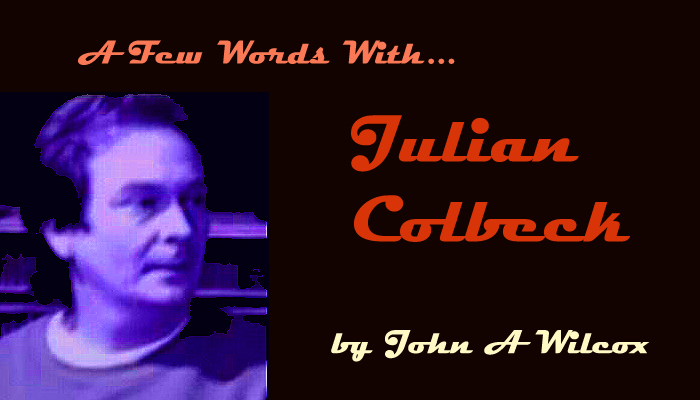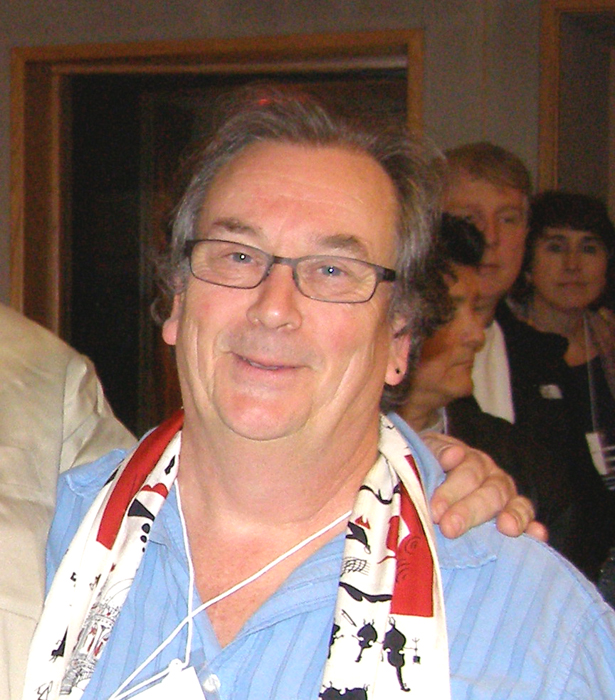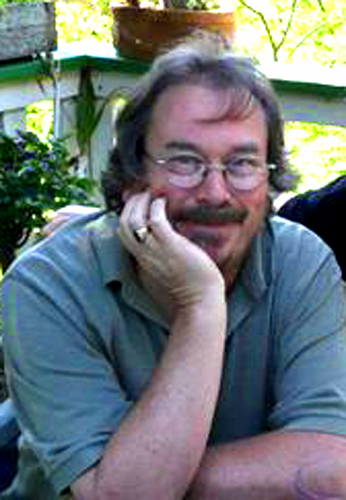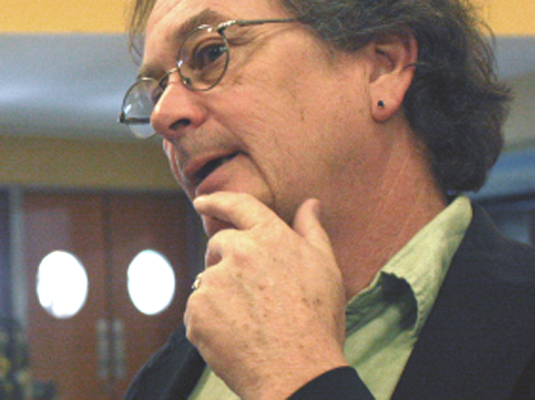Progsheet - A Few Words With...Julian Colbeck
A Few Words With...Julian Colbeck
By John A. Wilcox

Anderson Bruford Wakeman Howe, Steve Hackett, Charlie - when they needed a keyboardist who could tackle anything, they all chose Julian Colbeck. Colbeck is not only a world class keyboardist, he's also a writer and inventor. Progsheet was lucky to get Colbeck to share his thoughts with us...

PS: What the first record you recall buying & why did you buy it?
JC: The Moody Blues: Go Now. I think that was in 1964. I guess the same reason everyone else bought it, it sounded cool. That descending bassline works every time. Although I was studying classical piano at school at the time I'd just started my first group and was actually playing guitar. But Go Now's keyboard-heavy instrumentation was obviously a foretaste of where my inclinations would lead.
PS: What was the first live concert you attended?
JC: I'm really not sure I can remember. It might have been the 1969 Bath Blues Festival, or even the 1970 Isle Of Wight festival. I started playing concerts myself back in 1964 - school shows and shows for local hospitals and village halls. I've always played many more gigs than I've attended.
PS: What was the first gig your wife saw you play at?
JC: Charlie with The Doobie Brothers at Universal Amphitheater. She was working there as an usherette, though we didn't meet until a few years later. The first gig where she knew me was when I was playing with an LA top 40 band called Tropical Madness at El Paso Cantina. Quite a change!
PS: How, if at all, did marriage and children affect your professional life and decisions?
JC: My daughter was born two months before I embarked on a two-year stint with ABWH. The tours had breaks but I was still away a lot and although my wife and daughter did come to several shows it wasn't easy for her. Breast feeding and attending major concerts require quite the juggling act. After my son was born three years later I started to question the sense of being out on the road so much and that was certainly a major contributing factor on my decision to stop touring in 1996. If you don't get to see your family why did you have one?
PS: While you no longer play live, is there a live gig that stands out in your mind as the pinnacle of your live playing experiences?
JC: The Spectrum in Philly, with ABWH. As Bill Bruford says in his excellent autobiography, the noise the audience made when we came on stage was without doubt the loudest sound I've ever heard. It was painful and exalting in the same moment. Quite extraordinary. We played great and were kind of floating on air throughout the show after than incredible reception.
Musically, some of the shows Steve Hackett and I played together as a duo would be hard to top. Hard to pin down one gig in particular but those shows were so exposed and delicate. We were both on a knife-edge all night as there was no rhythm section, no band, no safety net. Great stuff. Some of those shows can be heard on There Are Many Side To The Night.
PS: You were on 2 tracks on Kitchens Of Distinction - the most recent Charlie album. How did you come to be involved in the band again & why only 2 tracks?
JC: Kitchens Of Distinction is really a solo album. It's Terry's concept, material, and 90% execution. And he's done a fantastic job in getting it out there. Terry and I stayed in touch over the years and he just called up one day and asked if I fancied playing on a couple of tracks. I said yes of course and he ftp-ed me some stems and I recorded them here in California. The album is much harder than most of the classic Charlie albums so the two tracks I played on were simply the ones that merited some featured keyboards. It was the first 'serious' recording ie: for a specific music recording as opposed to video/DVD beds and stings, which I'd mainly limited myself to, that I'd done in more than ten years. I was quite apprehensive in some ways but it's like putting on an old favorite T-shirt you haven't worn in years. Slip it on and you're instantly at home with its feel, texture, shape and smell.
PS: How and when did you first meet Terry Thomas and what made you want to record with him?
JC: I met Terry at Trident Studios in 1976 when I was hired to do some keyboards on Charlie's No Second Chance album. I was instantly impressed with Terry's professionalism, both as a producer and a guitarist. I'd done some recording at that point, but not a lot, and the bands I'd recorded with before that were much less savvy in the studio. Personally, we hit it off too. We're very different but very complimentary. I'm not sure we've ever had a bad word.

PS: Many of us became aware of you because of your outstanding live work with ABWH and Steve Hackett.
What drew you to progressive music?
JC: Well that's interesting. The band I first recorded with was a band called Greep. Tony Stratton-Smith signed us to Charisma in 1973 and we made a few singles and the beginnings of an album. At one point Strat sent us down to a farmhouse in Devon run by a Mrs. Dartnell. Yes had written Tales From Topographic Oceans there, and it was just one of those inspiring 'away from it all' places. Genesis was on Charisma too, and one of Greep's first producers was David Hitchcock, who I think had produced Foxtrot. All of Greep was heavily into prog rock. Jim Matthews, the drummer, idolized Bruford, the guitarist Colin Fletcher, Steve Howe and Steve Hackett, the singer, Andy Winfield, loved Jon Anderson. I have to admit that at the time I was not into prog rock at all! I was forced to listen to Yes and Genesis and I simply thought there were too many notes. I was way more into American music: Motown, Stax, R&B, The Band, West Coast stuff from The Association, The Left Banke, and all of that.
It was purely by chance that I started working with all the people that the rest of Greep was into - and I imagine that must have caused a great deal of amusement and amazement in due course. So I came to prog from the 'inside' as it were; as a player, not initially a fan. Of course once you peek inside, you see both the mechanics and the magic, and that was that. I was hooked.
PS: Looking back on your days with Hackett, why do you feel he has survived in the business for so long?
JC: He's unique. He has a sound, and a style, and basically he's stuck to it. Although he's done blues (Blues With A Feeling), and several classical albums, as well as rock, he'd have had more commercial success by going mainstream and doing records with more widely popular artists. But I admire him for doing and playing what he likes. And what he likes is detail-orientated, interesting music, rather than mainstream. So, he's survived, but he could probably have been more 'popular' by going the Genesis V2 or even Peter Gabriel route.
PS: You've written for many music pubs over the years. When did you discover you had the unique gift it takes to write about the technical side of music in a conversational way?
JC: Thanks. In 1976 I was interviewed by Tony Mitchell for Sounds magazine in the UK. Sounds was essentially the paper that launched punk but it also carried instrument reviews. In 1976 synthesizers were just starting to become readily available and Tony asked if I'd consider trying my hand at writing a couple of 'keyboard' reviews. He told me I could just give him the basics and he'd turn it into English and something readable. Not to say I don't need an editor but he scarcely ever changed a word I ever wrote for the next five years with Sounds. I guess because I'm not a fundamentally technical person I can explain things quite well because it takes a lot of effort for me to understand things. But when I do, I really do, and so I can then pass on my experience to others, and break things down into words and phrases that actually mean something to ordinary people... like me.
PS: What weren't you getting out of MIDI that caused you to pioneer Twiddly Bits?
JC: MIDI had the rap of 'sounding bad' or sounding 'stiff' and some unmusical. Everyone thought the technology was cool, but just not terribly musical. I thought this was crazy because MIDI was only essentially sending back what you put in. So if the input could be made musical so should the output. The key was 'alternate' controllers - MIDI drums, guitar, wind instruments - that had all been designed so drummers could play flute or sax players play drums. I thought that was plain crazy. Why not use MIDI drums as a way for drummers to input cool drum beats, or a MIDI Wind Instrument so that a sax player could play a decent sax line in MIDI so we wouldn't have to suffer all those God-awful over pitch-bended keyboard-played 'sax' parts? It worked, and that was the basis for the Twiddly.Bits MIDI libraries: creating a library of authentic instrumental parts that had been created in MIDI by the proper players and on the proper instruments, that people could cut and paste into their own MIKDI compositions.
PS: As author of a Frank Zappa bio back in the 80s, what do you feel made Frank Zappa's compositions stand out, beyond the surface humor?
JC: Zappa simply took rock music to a whole different level. The humor wasn't only in the lyrics but also the music. His arrangements, instrumentation, use of counterpoint all fed into his wonderfully crazed view of humanity.
PS: What was the greatest thing you learned as a musician from delving into Zappa's life?
JC: Detail. It's all in the detail. Anyone can thrash away at even the most obscure chord sequences. But it's what you do on top, and in the background, that gives music staying power. I guess also the value of rehearsal. Zappa didn't really like to rehearse himself, and I'm very much that way myself, but to create a unit that has balls and beauty you need to play a lot.

PS: Does the sample ever truly compete with the original? Can a mellotron, or Steinway sample recreate the character of the originals, or is that an impossible task?
JC: They can recreate the character of the originals, sure. That's exactly what they do. But is that enough? That's the question. The mellotron was conceptually obviously way ahead of its time and although it does feature actual recordings of live players the reproduction system guaranteed that its realism was fairly minimal. It became, and remains, a sound in itself. Modern sampling is technically way more superior of course and to some extent it's impossible to distinguish between a digital recording of a Steinway and a sample (another digital recording!) of a Steinway. But in terms of how it feels and responds to the player, that's a different thing altogether. When you play a real Steinway, or a real B3, or even a real Rhodes, the experience is a million miles away from playing a Steinway, or a B3, or a Rhodes sample. No matter what keyboard 'controller' you use, it's going to feel different from the real thing, so you play differently. It's not only the keyboard action, either. It's the difference between sound coming at you through a set of loudspeakers and sound coming at you from all around, as on a Steinway, through a Leslie, which is an almost terrifying sound close-up on a B3, and even the typical or traditional amplification on a suitcase Rhodes, which contributes to its sound.
PS: Are all Yamaha Motif keyboards created equal, or does one stand head and shoulders above the others?
JC: Overall they get better and better but in truth each has its own plusses and minuses. I liked the relative simplicity and directness of the original Motif. The main piano sample is strong and true; very playable, as Stevie Wonder will also testify. The way the arpeggios were configured was limiting to some extent but that limitation also generated some interesting effects. The ES ironed out some of those kinks and, to some people, represents the best fusion of sounds and facilities. The XS is sonically much more powerful but it has a lot of operational gotchas which can be annoying and limiting. The way it treats SMFs - files only import as Type 0 - is especially annoying, and the large-format display and menu system is, well let's say idiosyncratic. But the sounds are quite terrific, and the multiple arpeggio capability is inspiring to play.
PS: Let me get your thoughts on a few vintage keys. Let's start with the DX-7. At one point in time, it just seemed to be everywhere. As a player, what was the appeal? What did it offer that no other keyboard had at that time?
JC: I first heard a DX7 at David Paitch's studio in Los Angeles months before it was released. It didn't take Einstein to figure this was a game-changing instrument, even though the interface and editing system was, and remained, daunting. No one had really heard that type of clarity before. Aside from one or two rarified predecessors this was the first time that FM, and 'digital' synthesizers had been heard, and it made everything else sound dull, flat, and old-fashioned by comparison. Ironically, it is now the DX7 that sounds old-fashioned. People's taste in synthesizers have returned to traditional analog techniques of oscillators, filters, and LFOs. I occasionally ponder the DX7 Revival but not too expectantly.
PS: Let me ask the same about the MiniMoog. Why is it such a beloved synth?
JC: It had the initial advantage of being the first musician-affordable, musician playable synthesizer. That type of position always helps. Bob was actually fairly modest about it in some ways. When I interviewed him back in 1994 he talked a lot about a 'collective consciousness' that was floating around in the 60s, where a lot of people were all tinkering around with the same basic concepts. The MiniMoog did and does sound genuinely powerful - the third oscillator, and its filters are key - and it was and is very controllable. There are no presets. Though it's not exactly tough to figure out you have to set it up yourself, and then you can play around with the filter and envelope generators or LFO is real time. Portamento was and still is an important feature for 'that' type of synth sound that was used extensively by Keith Emerson in the 1970s and remains widely used in electronic dance music today. The MiniMoog feels and plays like a real musical instrument and not too many synthesizers have ever done that.
PS: Why do you feel the Hammond B3 has endured for so very many decades? Is it a "comfort" sound?
JC: It's a comfort sound unless you're standing right next to a Leslie in full flight. Then it'll put the fear of God into you. All that snarling, and growling, and hissing. The thing's alive. The Hammond B3 has survived for two basic reasons I'd say. First because it's sound is so human, and expressive. I saw Joey de Francesco and Dr Lonnie Smith ('The Turbanator') play a duo show a few years back; just the pair of them on stage with back-to-back B3s. The range of emotion both players created was out of this world. They could go from a pin-drop whisper to nuclear explosion in quarter of a beat. Nothing, not even a Les Paul or a Martin, or frankly even a steam piano, has that type of dynamics. Secondly, and obviously related to this, the B3 is not a 'fixed' sound. The drawbars are living tone controls; ideally to be used constantly as you play. You shouldn't just find a setting and then sit on it. Great Hammond players like Bentmont Tench, or Rami Jaffee are constantly pushing and pulling and prodding.
PS: Do you ever get any pangs to play live again?
JC: It's six in the morning and I've just returned from an empty bar here in my hotel in Barbados where I found a nice grand piano and sat down for 30 minutes and played for the bar staff getting the room ready for breakfast. So, I can and do play 'live,' technically. I just choose not to shimmy about on stage with a touring rock band anymore. A lot of baggage comes with playing live in a commercial setting and I really don't want to unpack all that stuff again: stage clothes, monitoring, rehearsals, promoters, soundchecks, even to some extent audiences. I sympathize, though. I hardly ever went to go concerts when I was touring and now I realize it's tough being an audience. All that standing up, being told to stand up (or sit down) 'putting our hands together,' singing... when I used to go to quite a lot of shows a few years ago with my kids I appreciated all that but used to find myself thinking:" Fuck off, mate. You're the one on stage. I've paid to see you. Don't ask me to do half the work." It's an interesting dichotomy; just one I'd prefer to not to have to try and balance these days.
PS: Please tell me 6 CDs you always enjoy listening to.
JC: In no particular order, but these always work for me, anytime, anyplace:
The Divine Comedy - Absent Friends
The Band - The Band
Bob Dylan - Modern Times
Thomas Dolby - The Golden Age Of Wireless
Steely Dan - Aja
Pink Floyd - Ummagumma
###
Table Of Contents
Contact




